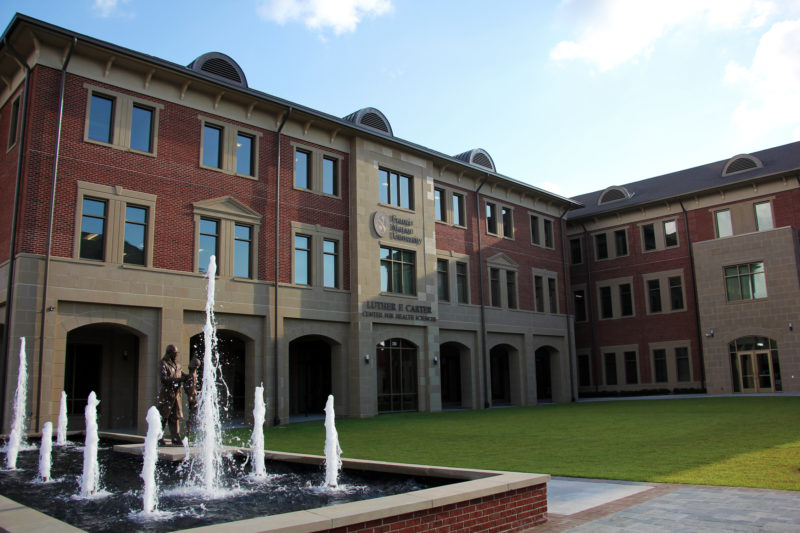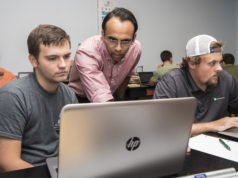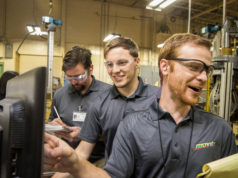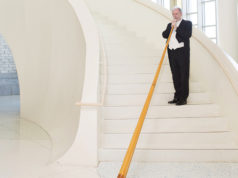With the opening of the Carter Center, FMU’s commitment to a ‘healthy’ future seems clear
Every day at work is a little different for Cindy Gainey (BSN ‘11, MSN-FNP ’14) but there is one constant she can count on.
She’ll be needed.
Gainey is a Family Nurse Practitioner in the emergency room at McLeod Health’s Dillon Hospital. Every day, patients roll in with all the typical ailments and injuries an ER professional expects to see, but with much more as well.
“There are quite a few who are basically just using this as their doctor’s office,” says Gainey. “I see that, we all do, every day. They’re doing it because of the cost, because it’s where they can get to, and because it’s what they know to do.
“We have counselors who try to get them to a low-cost or free family practice, but that can be difficult. So we do what we can. If we weren’t here, they’d have to drive to Florence, or maybe the beach, and for a lot of them, that’s pretty hard to do, which means it might be us or nothing at all. That’s why you do this. I love my job and feeling, every day, that you’re really making a difference.”
Gainey, a Florence native who played softball at FMU in the late 1980s but returned years later to obtain her undergraduate nursing degree, says she loves the career she’s chosen. She’s headed back to school now to obtain her doctorate so she can teach – maybe at Francis Marion – coming generations of nurse practitioners.
“In this area (the Pee Dee) we need all the help we can get,” says Gainey. “That need, it’s out there every day.”
Numbers back Gainey up. The Pee Dee, and South Carolina for that matter, are facing grievous shortages of professional medical practitioners of every stripe. From nurse to doctors and the growing legions of those in between, South Carolina’s citizenry is underserved.
Poised to serve
Fortunately, Gainey’s alma mater is on the case.
Francis Marion University has embarked on a signal program of developing and operating new programs designed to educate students like Gainey, and produce an ever-increasing number of practitioners. The university is already a significant provider of healthcare professionals – nurses, nurse practitioners, nurse educators and clinical psychologists – and in the years ahead, those programs will grow and new ones will be added. A wide range of new degree offerings are already in FMU’s developmental pipeline.
The dramatic move into this field is both a turning point for FMU and an obvious continuation of its long-standing mission to serve the needs of the people of South Carolina and the Pee Dee. As the state’s population swells and ages, nothing will matter more than finding ways to put new medical boots on the ground.
FMU is poised to do just that, says President Fred Carter, the architect of the university’s new emphasis.
“We are positioned to provide what both our community and our students need most in the years ahead – a ready source of high quality health care education,” says Carter. “We are absolutely committed to that. Nothing could be more important.”
Decades in the making
Francis Marion University’s burgeoning new School of Health Sciences, and all that that entails. appears to some outsiders to have simply popped out of the ground a couple years ago; a rapid response to health care’s growing needs in the Pee Dee, the state and the nation.
In fact, it’s been in the works for nearly two decades, or ever since FMU began moving in the early 2000s to assume control of the nursing program on the FMU campus. Prior to that, FMU’s nursing degree was offered through a joint arrangement with the Medical University of South Carolina. But that arrangement, while beneficial in its day, was wearing thin. The distance from home base, combined with the usual stigma associated with being what amounted to a satellite program, made it less appealing to prospective students than it should have been. So, shortly after assuming the FMU presidency, Dr. Fred Carter made it a priority to bring the program under the university’s direct control.
The idea then, says Carter, was simply to improve a program that was already growing in stature and importance in the eyes of students, not build a school focusing on health care professionals.
“But, one thing to led to another,” Carter says. “Creating an excellent baccalaureate program in nursing led to a demand for graduate programs, and that led to all kind of other ideas. It wasn’t difficult to imagine something like that happening, but it wasn’t designed that way from the beginning.”
The program did grow, however. Nursing success – FMU is always among the state’s leaders in pass rates on the difficulty NCLEX exams for nursing licensure – created a demand from alums, and other practicing nurses, who wanted to further their careers by advancing their education. FMU added an RN-to-BSN program to complement the BSN program, launched masters programs for Nurse Educators and Family Nurse Practitioners in 2012, and began the approval process for the new Physician Assistant (PA) program shortly after. The PA program’s first class enrolls this year. New programs in health care management (there’s a BA program and a masters program in this year) began last year. Masters programs in Clinical Psychology, a long-standing FMU program of high repute, is part of the mix as well, and more is on the way.
More on the way
FMU is working to complete the approval process for a degree program in Speech Therapy and Pathology, with the hoping of enrolling the first students in the next couple years. Similar offerings in Physical Therapy, Occupational Therapy and Radiological Therapy are being explored. The latter will tie in nicely with FMU’s pre-med programs in Biology and Chemistry, and its existing major of Health Physics, which resides in FMU’s Department of Physics, in the College of Liberal Arts. That program has already sent dozens of FMU graduates into a health care career, managing the growing array of radiation-based devices.
Also in the planning stages: an innovative program in Recreational Therapy, a burgeoning new field that combines learning from a variety of academic areas (music, the arts, kinesiology, biology, psychology among others). Graduates would provide prescriptive therapeutic treatment for patients across a spectrum of special needs.
“The world desperately need more medical providers and our students have a strong desire to jump into these careers,” says Carter. “The demand just keeps growing. We’re going to do our best to meet it.”
It will be a stern task. The number of students self-identifying as future nurses and the like seems to jump at every Open House event the university holds. And when the new PA program opened the door to potential students last fall, it was met with avalanche of more than 1,500 inquiries and applications.
That was for a program with 32 seats.
A model campus
Dr. William H. “Bill” Hester is an old school physician who believes in personal relationships and doctors who know who to “take a good (medical) history.
“Nothing is more important,” says Hester, the man who will run the University of South Carolina School of Medicine’s regional campus in Florence. Eventually, 50 or more aspiring medical doctors will run through their clinical rotations every year in Florence hospitals and medical practices. Some classroom work will be required and their academic home – their base if you will — will be FMU’s Carter Center of Health Science.
Bill Hester is not a man who views the practice of medicine as a numbers game. But … he understands that at some level it all about numbers. The Pee Dee and South Carolina are both woefully short of physicians. The state’s four medical schools all increased the number of students accepted about six years ago, when the doctor shortage alarm was sounded. That pushed the number of annual grads to about 500, but that’s still not enough, not even close really.
In time, the opening of the Florence campus will help, but it won’t close the gap. The only real solution is dramatically increasing the number of mid-level practitioners – Nurse Practitioners and Physician Assistants – in the workforce.
“It’s exciting that we’re going to be turning out doctors here (at the Florence campus),” says Hester, “but even with all that, and some more doctors at other places it still won’t be enough. That’s why there’s no doubt in my mind that the PA’s and the Nurse Practitioners – physician extenders they are sometimes called – will flourish. The fact is, they have to.”
That is the future of medicine, says Hester. So what really excites him about the mix of students who’ll be studying together at the Carter Center is that they are representative of the mix of medical professionals who’ll be working in area hospitals, practices and clinics in the years to come.
“Our (meaning the USC School of Medicine) students will work with the Nurse Practitioners and Physician Assistants in labs and classes. They’ll be side by side in a multi-disciplinary setting. They’ll learn to work together, learn how to be utilize the physician extenders, so that when they head out into practice that will really be second nature. It’s a wonderful partnership and really, a model for what a regional medical campus should be.”
But that may not be the end of the line for FMU and the Health Sciences
Time will tell
City and community leaders in Florence praise FMU’s decision to locate the Carter Center in downtown Florence for a number reasons. It plays a role in economic development; boosts the ongoing revitalization of the downtown core; and places a place of learning, an intellectual beacon if you will, in the heart of the community. That latter effect is enhanced by the fact that it’s just a block away from FMU’s first foray into town, the Performing Arts Center.
Dr. Eddie Floyd, chair of the Drs. Bruce and Lee Foundation which provided significant funding for both the Carter Center and the PAC, calls the arrival of the two facilities downtown, “mindboggling.
“You see it all and you don’t know what to think,” says Floyd. “The possibilities that accrue from this just seem limitless.”
And yet, at the center of it all, is the need that Cindy Gainey sees every day. Good government can serve people in many ways. None is more critical than through providing basic health services.
Florence Mayor Stephen Wukela says that, “while it’s great that the Carter Center is downtown and that it will serve as a catalyst, and more, for all that is going on down there – and I can tell you, the city is very appreciative of that — at the end of the day what really matters is the young men and women who will come out of that facility ready to serve the most vital needs of our community.
“That’s going to create a continuing legacy that will serve this city and this region for decades, even centuries, to come.”
Adds Floyd, “We’ve got such great healthcare facilities in this community already, and now this. It’s going to change the face of the region for years to come. It’s going to be exciting to watch that develop.”
What form will that development eventually take? Could the Florence’s “model” regional medical campus one day become the Francis Marion University School of Medcine?
Pose that question to any of the leaders involved in bringing the Carter Center to fruition that question and you’ll get a smile and a shrug.
Twenty years ago, who imagined anything like this at FMU and in Florence?
Twenty years from now … well, time will tell.







